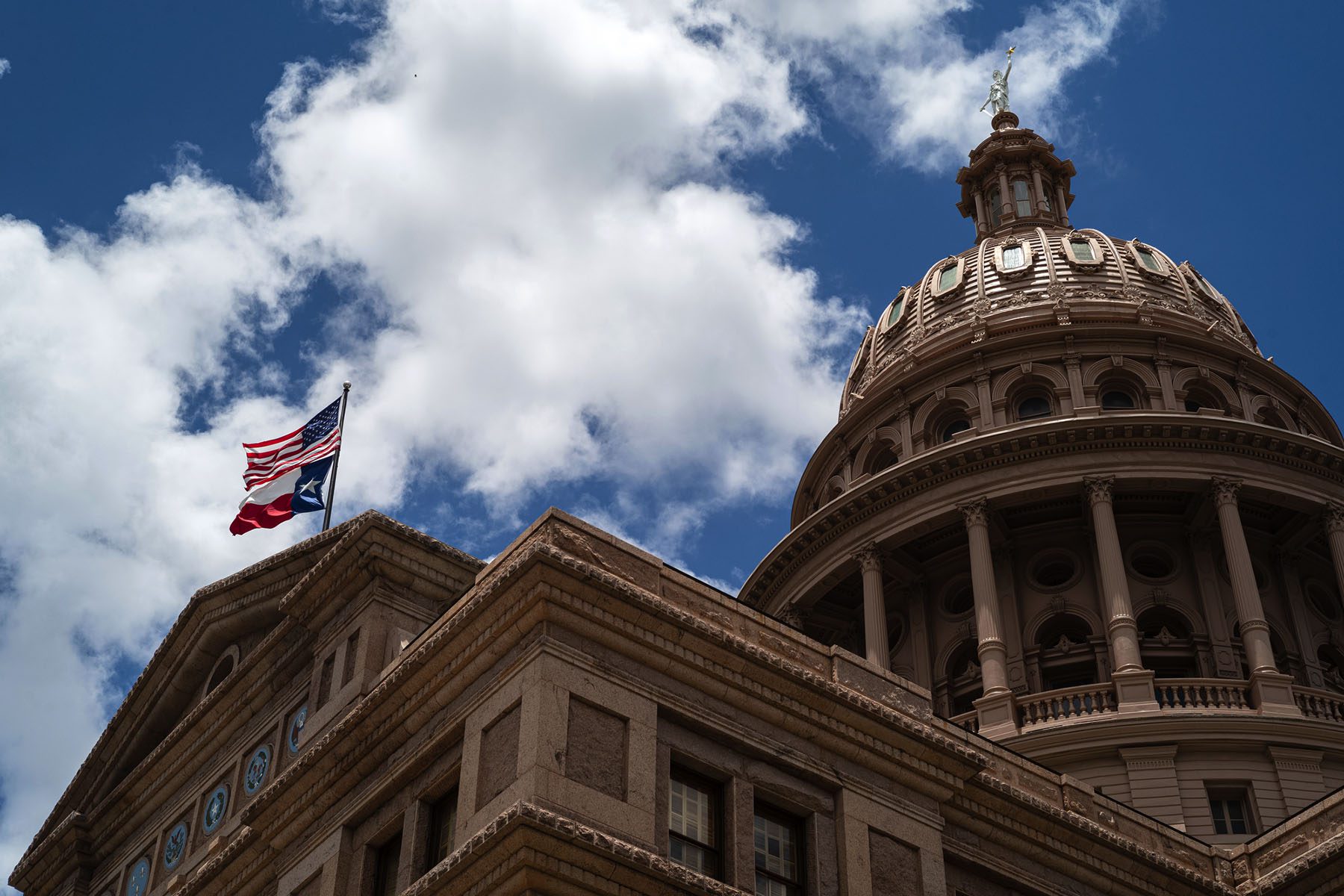Texas Gov. Greg Abbott on Monday signed a bill that would ban K-12 transgender students from playing on sports teams that match their gender identity — the first such bill to become law in the state, after dozens of similar bills were introduced and debated over three special legislative sessions.
The bill is the first piece of anti-trans legislation in Texas to actually become law in recent years. The state’s effort to restrict trans Texans’ bathroom usage failed to reach the governor’s desk in 2017 after a similarly intense special session. Texas is now the ninth state this year to pass legislation restricting how trans athletes can join school sports.
LGBTQ+ advocates are worried about the direct aftermath of the bill, which could subject trans students in interscholastic sports to scrutiny and harassment, as well as the potential for similar bills targeting trans youth to become law in Texas if another special session is called.
“It’s just panic right now … people trying to understand what exactly this looks like,” said Emmett Schelling, executive director for the Transgender Education Network of Texas.
More families have been reaching out to the organization than usual to ask how their child could be impacted by the law, especially parents with kids who had previously planned to participate in school sports and trans kids who aren’t totally out at school, Schelling said.
He described feeling “just the overall dread of not knowing how we can really calculate what the impact and the harm, outcome, will be.”
The new law requires schools to identify athletes based on the sex noted on their birth certificate either at the time of birth, or soon after it — which would force trans students to compete on teams that do not match their current gender identity. Texas’ regulatory body for high school athletics had previously allowed students to compete under updated birth certificates.
How schools would enforce the law — by determining whether a child’s birth certificate has been updated because of a clerical error, or because they have updated their gender marker — is unclear, and likely open to interpretation from district to district.
Schools upholding the new law could also be vulnerable to lawsuits, in part because of the potential variation in enforcement among the roughly 1,200 Texas school districts, said Adri Pèrez, a policy and advocacy strategist for the ACLU based in Austin, Texas.
“There has been debate since this bill was first filed about what the enforcement mechanism would be,” they said. “It would open it up so that anybody could bring a gender challenge against another student because of their athletic performance, and/or appearance.”
The ACLU is still exploring legal options for mounting a lawsuit against the bill, Pèrez said. The civil rights group sued over a similar law targeting trans athletes in West Virginia that had gone into effect this year. That law was temporarily blocked by a federal judge in July.
Even before the passage of Texas’ law targeting K-12 sports, the debate over anti-trans bills has caused increased bullying and mental health crises across the state, advocates say.
I think for me to keep doing this work, I can’t tell myself that it’s never going to end.
Emmett Schelling, executive director for the Transgender Education Network of Texas
Since anti-trans bills began to be debated at the start of the year, Equality Texas has gotten many more reports of bullying and harassment against LGBTQ+ students than they did last year when they first began tracking the incidents, said Ricardo Martinez, the group’s chief executive.
Examples include a pansexual freshman in Royse City who said she and her other queer friends were harassed by a student who sprayed them with holy water at lunch and a trans middle schooler in the greater Austin area who tried to take her own life after being bullied.
“It is a marked difference from last year,” Martinez said.
The Trevor Project said last month that crisis calls and texts from LGBTQ+ youth in Texas have grown over 150 percent when compared with the same time period in 2020. In those calls, some trans and nonbinary youth said they felt stressed, were using self-harm or considering suicide because of anti-LGBTQ laws being debated in the state.
Advocates have repeatedly warned that rhetoric surrounding the bills, which characterizes trans girls as boys and in Texas has devolved into arguments over what “transgender” and “cisgender” mean, could also spur violent and potentially deadly attacks against trans people — although more research is needed to understand a direct link.
In many states where anti-trans bills have been proposed, there is a lack of evidence of trans people posing a threat to sports teams, or even playing sports at all within some states.
One example is Arkansas. Republican Gov. Asa Hutchinson compared the state’s sports bill and the state’s effort to ban gender-affirming care for minors — the latter of which he opposed — as a theoretical fight vs. a fight that could have real consequences for trans kids.
Hutchinson acknowledged in May that “no one has cited an example of where trans athletes have tried to compete [in the state]” — as did West Virginia Gov. Jim Justice in April, when asked for examples of trans athletes trying to get an unfair advantage in sports.
Texas’ third special session has ended, Abbott has shot down calls from within his party for a fourth session, and the next regular legislative session starts in 2023. Still, fears of trans kids again being named a priority in the Texas legislature remain.
“I think we can likely expect more anti-trans bills given the current leadership,” Schelling told The 19th over text.
-
More from The 19th
- In Western Massachusetts, a clinic by and for transgender people seeks to revolutionize health care
- ‘It’s just been a living nightmare’: Texas House passes anti-trans bill, and families struggle to cope
- Pete Buttigieg took parental leave. LGBTQ+ advocates and administration officials say that should be normal.
In a statement that could also signal the future of anti-trans bills in Texas, Abbott reportedly promised supporters at a Kingwood Tea Party meeting on Tuesday night that laws targeting trans youth will be advanced in “every single session that we have.” The governor’s office declined to comment and Abbott’s campaign office did not respond to a request for comment.
Other bills previously introduced in Texas across this year’s special sessions have aimed to classify gender-affirming treatments like hormones and surgeries as child abuse and ban puberty blockers provided by a physician. Some of those bills died in the House or were reintroduced in the third special session but did not move forward.
Two issues are top of mind for advocates if the governor again lists bills targeting trans youth as a priority: efforts to restrict people’s ability to update gender markers on birth certificates and bans on gender-affirming care for minors.
“We have also seen that his supporters have expressed desire for the sports ban to also begin to encroach into collegiate level sports,” Schelling said via text, referencing a reported Q&A during the Kingwood Tea Party meeting. “I wouldn’t rule anything out.”
Although many states have introduced bills targeting gender-affirming care for trans youth, nearly every anti-trans bill that has actually made it into law this year has been about sports. Arkansas’ law criminalizing gender-affirming care for minors was temporarily blocked by a judge in July and is still working through the courts, as the state appealed the injunction in September.
In contrast, birth certificates have been at the core of debate surrounding the new law on K-12 sports in Texas — and some lawmakers, like Republican state Sen. Charles Perry, have previously introduced bills that would keep minors from updating their birth certificates to match their gender identity.
Vivian Topping, director of advocacy and civic engagement at the Equality Federation, a coalition of statewide LGBTQ+ organizations, said that efforts to target birth certificates are what she’s most concerned about right now, alongside health care and athlete bans being brought across more states.
“Anti-trans attacks are not going away and they’ll continue in whatever form our opponents can create,” she said over text.
Although the Equality Federation hasn’t tracked bills solely focused on birth certificates in its state legislation tracker, Topping estimated that only a handful of such bills have been introduced across the country this year.
“We have seen that in other states before … so I can see where the fear would come with these athlete bans,” she said.
Martinez said he is worried that Texas passing its first anti-trans bill of the year could also influence how other state legislatures press the issue.
“It’s a huge deal,” Martinez said. “I’m afraid of what’s going to happen when other state legislatures begin pre-filing bills.”
Schelling said that even though the landscape can seem grim, he has to believe in the progress of the movement to keep going.
“I think for me to keep doing this work, I can’t tell myself that it’s never going to end. I know that we’ve seen progress, even in the midst of this,” he said, pointing to the hundreds of people — including trans Texans and their families — who have traveled to the state capitol multiple times this year to testify against the bills.
One of those advocates who has frequently gone to the capitol, Rev. Remington Johnson, said over text that she is proud of the effort that advocates have spent in the past year, as Texas introduced the most anti-trans bills of any other state in the country.
“We did everything we could to stop, slow down or amend these bills,” Johnson said. “Only a single one got through.”
Although the fight doesn’t feel like it’s over for some parents and trans Texans in the state, after months of testimony left them exhausted, a brief reprieve is expected.







